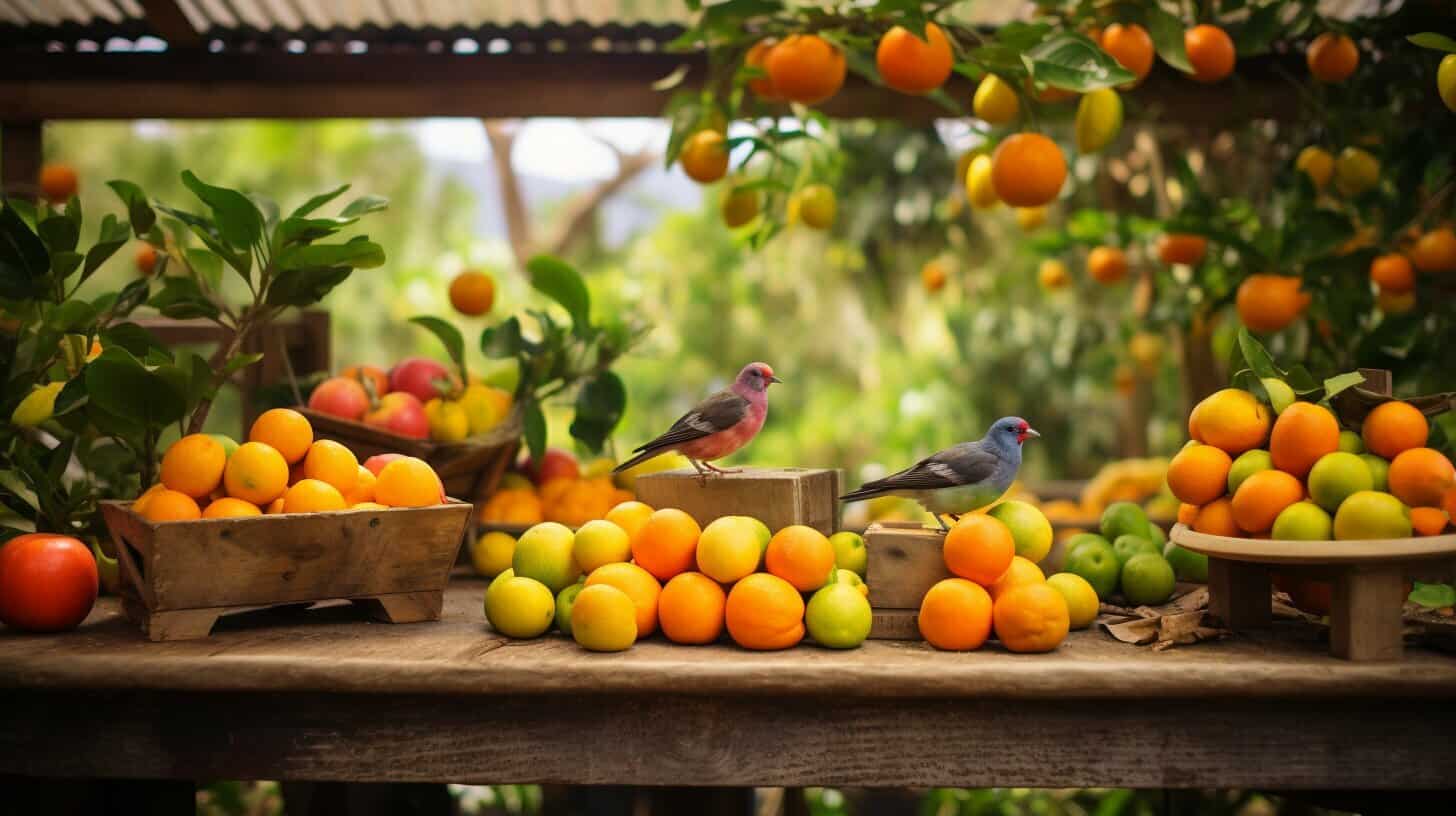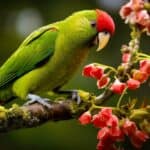As a kakariki owner, you want to ensure your pet bird receives a balanced and nutritious diet. This includes providing them with safe and suitable foods, but you may be wondering whether oranges are a healthy option for your kakariki. In this section, we will explore whether kakarikis can eat oranges and provide an overview of their diet and nutrition.
Can Kakarikis eat oranges? Yes, Kakarikis can eat oranges. These vibrant New Zealand parakeets enjoy a varied diet, and oranges can provide beneficial vitamins like vitamin C. However, like any other treat, it should be given in moderation to prevent dietary imbalances.
Kakarikis are a species of parrot that originate from New Zealand. They primarily feed on fruits, nuts, berries, seeds and insects in their natural habitat. A well-balanced diet is crucial for your pet kakariki’s optimal health and well-being, but it is equally important to be aware of any foods that could be potentially harmful to them.
Key Takeaways:
- Kakarikis primarily feed on a diet of fruits, nuts, berries, seeds and insects in the wild.
- A well-balanced and nutritious diet is crucial for your pet kakariki’s optimal health and well-being.
- It is important to be aware of any potentially harmful foods when feeding your kakariki.
Understanding the Kakariki Diet
If you’re considering getting a kakariki as a pet, it’s important to understand their dietary needs. In the wild, kakarikis mainly feed on seeds, fruit, and insects.
As a pet owner, you should aim to replicate their natural diet as closely as possible. A balanced diet for a kakariki should consist of:
| Food group | Examples |
|---|---|
| Seeds | Grass seeds, millet, sunflower seeds, hemp seeds |
| Fruit | Apple, banana, orange, kiwi, berries |
| Vegetables | Carrots, spinach, kale, sweet potato, broccoli |
| Pellets | High-quality pellets specially formulated for kakarikis |
It’s important to provide a variety of foods to ensure your kakariki receives all the necessary nutrients. Fresh food and water should be provided daily.
Feeding Pet Kakarikis
If you’re purchasing food for your kakariki, buy it from a reputable store. Avoid giving your bird any food that is past its expiration date, as it may contain harmful bacteria.
If you’re feeding your kakariki a homemade diet, it’s important to do your research and ensure you’re providing a balanced and nutritious diet. Consult with your veterinarian for advice on creating a suitable diet for your bird.
If you’re introducing new foods to your kakariki’s diet, do so slowly and in small amounts. This will give your bird’s digestive system time to adjust to the new food.
By providing a healthy diet for your kakariki, you can help ensure they live a long and happy life.
The Importance of Balanced Nutrition for Kakarikis
As a responsible kakariki owner, it’s essential to understand the significance of providing a balanced and nutritious diet for your pet bird. A well-fed kakariki is a happy bird, and a happy bird is a healthy one!
Kakarikis require a varied diet that includes a range of fruits, vegetables, seeds, and pellets. Each food group provides essential nutrients that contribute to your bird’s overall health and well-being. For example, fruits offer vitamins and minerals, while seeds are a good protein and healthy fats source.
However, it’s important to strike the right balance when feeding your kakariki. Too much of one food group can lead to nutritional imbalances and health issues. For example, a diet that’s too high in seeds can lead to obesity, while a diet lacking in fruits and vegetables can cause vitamin deficiencies.
It’s also important to take your kakariki’s food preferences into account. While some birds may be happy to eat anything you offer, others may be pickier eaters. Pay attention to your bird’s likes and dislikes, and adjust their diet accordingly.
Overall, providing a balanced and nutritious diet is crucial for the health and happiness of your kakariki. By offering a variety of foods and paying attention to your bird’s individual needs and preferences, you can ensure they receive the optimal nutrition they need to thrive.
Exploring Fruit Options for Kakarikis
Kakarikis love fruits and can benefit from adding them to their diet. Besides adding variety to their meals, fruits are packed with vitamins and minerals that are crucial for their health. However, not all fruits are suitable for kakarikis, and some may cause digestive problems or other health issues if consumed in large quantities.
So, which fruits are safe and beneficial for kakarikis?
| Fruits | Comments |
|---|---|
| Bananas | High in potassium and fibre, but should be given in moderation as they have high sugar content. |
| Apples | Low in fat and high in fibre, apples are a great source of vitamins A and C. |
| Grapes | Grapes are high in sugar, so should be given in small amounts. They are a good source of vitamins A and C. |
| Berries | Kakarikis love blueberries, raspberries, and strawberries. They are rich in antioxidants and vitamins. |
| Papaya | Papaya contains enzymes that aid digestion and is a good source of vitamins A and C. |
| Kiwi | Kiwi is high in vitamin C, fibre, and antioxidants. Remove the skin before feeding. |
| Oranges | While oranges are safe for kakarikis to consume in small amounts, they should not be a regular part of their diet. More on this in the next section. |
Remember always to remove any seeds and wash the fruits thoroughly before feeding them to your kakariki. You can offer fruits as a snack or mix them with vegetables or pellets to create a balanced meal. Providing a variety of fruits can help your kakariki get the nutrients they need while keeping their meals interesting and tasty.
Can Kakarikis Eat Oranges?
If you’re a kakariki owner, you might wonder if you can feed your feathered friend some oranges. While it’s true that citrus fruits are generally not recommended for birds, kakarikis can consume oranges in small quantities.
However, it’s important to note that oranges should not be a significant part of your kakariki’s diet. They should only be given as an occasional treat, as too much citrus can cause digestive issues and other health problems in birds.
If you decide to give your kakariki some oranges, introduce them gradually and in small amounts. Watch for any allergic reactions or adverse effects, and consult your vet if you have any concerns.
Factors to Consider Before Feeding Oranges to Kakarikis
If you are thinking about feeding oranges to your kakariki, several important factors must be considered. Firstly, you must introduce any new food to your birds’ diet slowly and in small quantities. This will help to prevent any potential digestive issues or allergic reactions.
Secondly, you should be aware that some kakarikis may be more sensitive to acidic fruits like oranges than others. If your bird has a history of digestive problems or is prone to gastric upsets, it may be best to avoid feeding them oranges altogether.
Thirdly, it’s essential to ensure that the oranges you provide are free of pesticides or harmful chemicals. Organic oranges are a great choice if you are unsure about the quality of the fruit you have purchased.
Finally, it’s worth noting that even though most kakarikis enjoy the occasional piece of fruit, their diet should primarily consist of a well-balanced mix of pellets, seeds, and fresh vegetables. While oranges can be a nutritious addition to their diet, they should only be given in moderation.
Alternatives to Oranges for Kakarikis
If you’re unsure about feeding your kakariki oranges or they don’t seem interested in this fruit, there are plenty of other options that can provide the necessary nutrients for a balanced diet. Here are some safe and suitable fruit alternatives:
| Fruit | Nutritional Benefits |
|---|---|
| Apples | High in fibre and Vitamin C |
| Berries | Rich in antioxidants and Vitamin C |
| Mangoes | Contains Vitamin A and fibre |
| Peppers | High in Vitamin C and low in sugar |
| Pineapple | Rich in enzymes and Vitamin C |
| Pomegranate | High in antioxidants and Vitamin C |
Remember, fruits should only make up a small part of your kakariki’s diet. It’s important to provide a variety of vegetables, seeds, and pellets to ensure they receive the necessary nutrients for optimal health.
Meeting the Nutritional Needs of Kakarikis
Providing a nutritious and balanced diet is essential to keep your pet kakariki healthy. As omnivores, kakarikis require a mix of fruits, vegetables, seeds, and pellets to ensure they receive the necessary vitamins and minerals.
When considering the ideal balance of your kakariki’s diet, it’s important to take into account their food preferences. While they can eat a wide variety of foods, some kakarikis may be picky eaters and have individual likes and dislikes.
Recommended Fruits for Kakarikis
When it comes to fruit, there are several options that are safe and nutritious for your kakariki. These include:
- Berries such as strawberries, raspberries, and blueberries
- Kiwi
- Apples (without seeds and core)
- Pears (without seeds)
- Watermelon
While some fruits such as oranges can be fed in moderation, it’s important to avoid fruits with high amounts of sugar or acidic content as they can cause digestive problems or other health issues.
Recommended Vegetables for Kakarikis
Vegetables are a great source of vitamins and minerals for your kakariki. Some recommended options include:
- Corn
- Peas
- Carrots
- Broccoli
- Celery
It’s important to ensure that vegetables are washed and cut into small pieces to avoid choking hazards.
Recommended Seeds and Pellets for Kakarikis
Seeds and pellets are also an important part of your kakariki’s diet, providing a source of protein and other essential nutrients. Some recommended options include:
- Millet
- Sunflower seeds
- Safflower seeds
- Pellets specifically formulated for kakarikis
It’s important to ensure that seeds and pellets are not the only source of nutrition for your kakariki, as they lack certain vitamins and minerals that can be found in fruits and vegetables.
By ensuring a balanced and varied diet for your kakariki, you can help to promote their overall health and well-being. Pay attention to their food preferences, and always introduce new foods slowly to avoid any potential digestive issues.
Conclusion
Congratulations! By reading this article, you have better understood the kakariki diet and nutrition. While oranges may seem like a tasty treat for your pet kakariki, it’s important to consider their needs and preferences before introducing new foods into their diet.
A balanced and nutritious diet is key to ensuring your kakariki’s optimal health and wellbeing. It’s important to offer a variety of fruits, vegetables, seeds, and pellets to ensure your feathered friend receives all the necessary nutrients they require.
If you’re still unsure about feeding oranges to your kakariki, there are plenty of safe and delicious alternatives to choose from, such as blueberries, kiwi, and mango. Just remember to introduce new foods gradually and monitor your kakariki’s reaction to ensure they are happy and healthy.
Always prioritize your kakariki’s health and wellbeing by providing them with a nutritious diet tailored to their needs. Doing so lets you enjoy a long and happy life with your feathered friend.
FAQ
Q: Can kakarikis eat oranges?
A: Yes, kakarikis can eat oranges. However, it is important to consider certain factors before introducing oranges into their diet.
Q: What is the typical diet of kakarikis?
A: The typical diet of kakarikis includes a variety of fruits, vegetables, seeds, and pellets.
Q: Why is balanced nutrition important for kakarikis?
A: Balanced nutrition is crucial for the optimal health of kakarikis, providing them with the necessary vitamins, minerals, and nutrients they need to thrive.
Q: What are some suitable fruit options for kakarikis?
A: Suitable fruit options for kakarikis include apples, grapes, bananas, and berries.
Q: What factors should be considered before feeding oranges to kakarikis?
A: Before introducing oranges into your kakariki’s diet, important factors to consider include potential allergies, digestive issues, and portion sizes.
Q: What are some alternatives to oranges for kakarikis?
A: Some alternative fruit options for kakarikis include kiwis, pears, mangoes, and papayas.
Q: How can I meet the nutritional needs of kakarikis?
A: To meet the nutritional needs of kakarikis, it is important to provide a balanced diet that includes a variety of fruits, vegetables, seeds, and pellets.



Have comments or questions about this article? Then get involved!
Spotted an error or something we have missed? Let us know